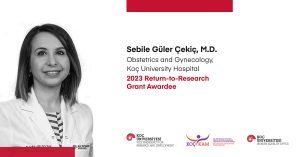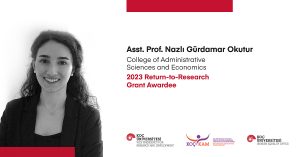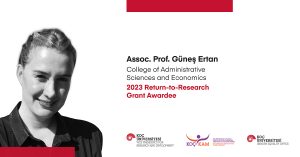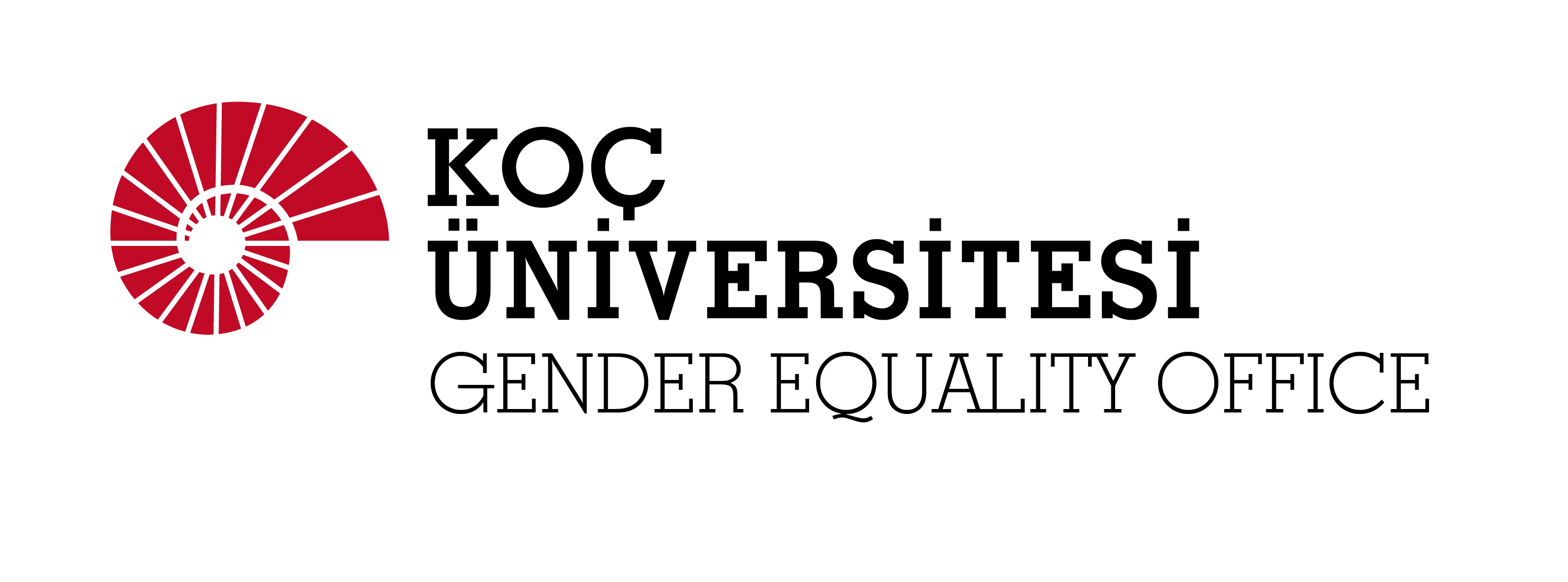 The Gender Equality Office at Koç University has collaborated with Office of the Vice President for Research and Innovation (VPRI), to develop an innovative scheme that aims to support female academics who are reintegrating into academia after career breaks. The Return-to-Research grant is a new funding component of Koç University’s internal research and innovation funding program, the Seed Research Fund (KU-SRF).
The Gender Equality Office at Koç University has collaborated with Office of the Vice President for Research and Innovation (VPRI), to develop an innovative scheme that aims to support female academics who are reintegrating into academia after career breaks. The Return-to-Research grant is a new funding component of Koç University’s internal research and innovation funding program, the Seed Research Fund (KU-SRF).
The Return-to-Research grant is specifically designed to address the challenges faced by female scientists who have taken time off for caregiving responsibilities. The grant provides institutional support for female faculty members to make a smooth transition back to their research careers. The grant recognizes that refamiliarizing with science and doing extensive work on recent publications after a long career break may be challenging, and provides a supportive environment for the researcher to focus initially on research with a re-entry funding scheme that allows them to do the same on a firmer foundation.
To be eligible for the grant, the principal investigator (PI) should be a female faculty or research faculty who have taken a family-related leave of absence for a duration of 16 weeks or more within the 12 months prior to the call deadline. The PI candidate should have returned to KU employment full time by the date of the call deadline. If the candidate has completed a previous Return-to-Research project, and has another career break that makes them eligible, they can apply for another Return-to-Research.
The grant can also cover travel expenses for attending national or international conferences, workshops, and related activities as well as graduate student support costs, provided that these expenses are justified as crucial to the reestablishment of the PI’s research career. All other rules and reminders for KU-SRF also apply to Return-to-Research.
Koç University recognizes the importance of promoting work-life balance and family-friendly workplaces. The Return-to-Research grant is an essential component of Koç University’s Gender Equality Plan (KUGEP) action item that aims to develop a funding scheme for employees to support their research after family-related breaks. The grant acknowledges the gender-sensitive disadvantages that may arise from gender-blind policies, and provides female faculty members with the necessary resources to update their lecture materials and refocus on their research after a long career break.
The Return-to-Research grant is part of a global effort to support women who have taken career breaks to care for their families. Across the globe, there is a ‘motherhood penalty’ where mothers who are researchers are under-valued and seen as less competent and dedicated to their work than fathers. Gender-blind rules can also disadvantage parents by not taking into account family-related career breaks. The Return-to-Research grant aims to address these challenges and support female scientists in their research careers.
Empowering Women in Academia: Celebrating the Return-to-Research Grant 2023
Koç University takes a momentous stride towards gender equality in academia as it announces the recipients of the inaugural “Research Support for Female Academics after Career Breaks” (Return-to-Research) grant. This innovative funding initiative, a collaborative effort between the Gender Equality Office, the Vice Presidency for Research and Development (VPRD), and KOÇ-KAM is a significant step towards fostering an inclusive academic environment that empowers women researchers.
The three awardees of the Return-to-Research grant, Asst. Prof. Nazlı Gürdamar Okutur from the College of Administrative Sciences and Economics, Dr. Sebile Güler Çekiç from Obstetrics and Gynecology at Koç University Hospital, and Assoc. Prof. Güneş Ertan from the College of Administrative Sciences and Economics, have been recognized for their exceptional research proposals that contribute significantly to academia and address important areas of study.
The Gender Equality Office conducted interviews with the three awardees of the 2023 Return-to-Research funding scheme, shedding light on critical aspects related to gender equality and support mechanisms for women academics returning to research after career breaks.
Dr. Sebile Güler Çekiç, who focuses on genitourinary syndrome in postmenopausal women, highlights the underrepresentation of women-centric medical research in grant opportunities. She states, “Studies focusing on women are underrepresented in research grants, and this is particularly true for those related to menopause. Underlying this may be social norms – menopause marking the end of fertility hence reducing women’s value in society as reproductive beings.”
The Return-to-Research grant is not merely financial assistance; it is an endorsement of the university’s commitment to promoting work-life balance and creating family-friendly workplaces. Dr. Nazlı Gürdamar Okutur stresses the significance of institutional support, especially for female academics returning after a career break, “Being away from work for a long time often causes one to lose touch with their field and their colleagues, and limits one’s access to resources and informal support that is essential for academic success. Being away from work can also reduce women academics’ visibility in their academic community, which can affect their professional relationships and career prospects.”
Dr. Güneş Ertan, another recipient of the grant, points out the challenges faced by female scientists during the process of reintegrating into academia. “The transition is difficult because we have less time to do the same work. After a baby, it is not as easy to study on a Sunday to catch up with work or focus on a project day and night to meet a deadline. Besides, babies bring a tremendous amount of mental load and uncertainty to our daily lives,” she shares.
The Return-to-Research grant reflects Koç University’s commitment to gender equality and recognizes the challenges faced by female scientists returning to academia after career breaks. Dr. Sebile Güler Çekiç emphasizes the importance of a supportive work environment and equal opportunities for women academics. “Return to work after an intense period of child care requires a big adjustment, and a supportive work environment is crucial, where line managers can actively monitor such employees’ well-being to ensure they are doing well. Ensuring women would go back to the same scales of pay upon return and are presented the same opportunities for career advancement is also crucial, as the glass ceiling is still a phenomenon for women. This kind of support requires institutional commitments so that it would not depend on individual practices,” she states.
To address the challenges faced by female scientists and to foster gender equality in academia, the grant emphasizes the need for family-friendly policies and flexible working arrangements. Dr. Nazlı Gürdamar Okutur recommends, “One of the things that can be done to improve work-life balance for researchers with caregiving responsibilities is to allow flexible working arrangements. For instance, providing options when scheduling classes, meetings, seminars, and other academic activities for female researchers who must balance their work and family obligations. This would enable them to manage their time more effectively and reduce the stress and pressure they may face. ”
The Return-to-Research grant stands as a beacon of hope, guiding the way towards a more equitable and supportive academic landscape. As these three remarkable awardees embark on their research projects, they not only contribute to the advancement of knowledge but also inspire future generations of women in academia. The grant serves as a testament to the institution’s commitment to creating an academic environment where all faculty members, regardless of gender or caregiving responsibilities, are valued and supported.
During the interviews, the awardees shed light on several critical aspects related to gender equality and support mechanisms for women academics returning to research after career breaks. Dr. Sebile Güler Çekiç emphasized the challenges faced by female scientists, particularly the feeling of “insufficiency” in balancing responsibilities at home and work. She stressed the need for a supportive work environment that recognizes the unique challenges faced by researchers with caregiving responsibilities.
The topic of affordable childcare emerged as a key concern for female academics, and Dr. Nazlı Gürdamar Okutur highlighted the importance of providing access to quality childcare to enable female researchers to resume their work without guilt or conflict. Both Dr. Çekiç and Dr. Okutur advocated for flexible working arrangements that would allow researchers to manage their time effectively and strike a balance between their professional and personal lives.
Additionally, Assoc. Prof. Güneş Ertan’s insightful suggestion about including childcare costs in project budgets emphasizes the need for formal support mechanisms over informal ones, providing female researchers with the necessary resources to navigate the challenges of balancing work and caregiving responsibilities. “We always joke we should be able to include childcare costs in our project budgets but maybe it is something to consider seriously,” she stated, underscoring the significance of considering such provisions seriously to empower women returning to academia after career breaks.
Dr. Okutur brought attention to the significance of longer paternity leaves for male researchers to reduce the gender gap in caregiving responsibilities and foster a more inclusive academic culture. These concrete recommendations are crucial steps toward improving gender equality in academia. In addition to institutional support, it is imperative to create an environment where women are provided with equal opportunities and conditions. As Dr. Çekiç noted, “we don’t want privileges over men, but rather want equal opportunities.” Addressing the challenges faced by female scientists who have taken career breaks requires institutional commitments to ensure a supportive and inclusive work culture.
Dr. Nazlı Gürdamar Okutur emphasizes the critical importance of women academics forming a supportive community to share their experiences and insights. She advises seeking help and support from other female researchers who have gone through similar experiences in the past. Such a community can provide valuable insights, guidance, and encouragement for the process of reintegrating into academia. Through mentoring, networking, and collaboration, they can offer practical and emotional support, helping female researchers overcome difficulties and achieve their goals of returning to research after a career break.
The interviews also revealed the resilience and determination of female academics. Dr. Çekiç’s encouragement for other women not to give up and assertively pursue every option available to them was echoed by all the awardees, who emphasized that female academics do belong in academia and should be supported on their journey back to research. These empowering words from all three awardees serve as a reminder of the immense talent and potential that female researchers bring to academia, deserving of equal recognition and opportunities.
The three awardees of the Return-to-Research grant, Asst. Prof. Nazlı Gürdamar Okutur from the College of Administrative Sciences and Economics, Dr. Sebile Güler Çekiç from Obstetrics and Gynecology at Koç University Hospital, and Assoc. Prof. Güneş Ertan from the College of Administrative Sciences and Economics, have been recognized for their exceptional research proposals that contribute significantly to academia and address important areas of study.
The Gender Equality Office conducted interviews with the three awardees of the 2023 Return-to-Research funding scheme, shedding light on critical aspects related to gender equality and support mechanisms for women academics returning to research after career breaks.

Dr. Sebile Güler Çekiç, who focuses on genitourinary syndrome in postmenopausal women, highlights the underrepresentation of women-centric medical research in grant opportunities. She states, “Studies focusing on women are underrepresented in research grants, and this is particularly true for those related to menopause. Underlying this may be social norms – menopause marking the end of fertility hence reducing women’s value in society as reproductive beings.”
The Return-to-Research grant is not merely financial assistance; it is an endorsement of the university’s commitment to promoting work-life balance and creating family-friendly workplaces. Dr. Nazlı Gürdamar Okutur stresses the significance of institutional support, especially for female academics returning after a career break, “Being away from work for a long time often causes one to lose touch with their field and their colleagues, and limits one’s access to resources and informal support that is essential for academic success. Being away from work can also reduce women academics’ visibility in their academic community, which can affect their professional relationships and career prospects.”

Dr. Güneş Ertan, another recipient of the grant, points out the challenges faced by female scientists during the process of reintegrating into academia. “The transition is difficult because we have less time to do the same work. After a baby, it is not as easy to study on a Sunday to catch up with work or focus on a project day and night to meet a deadline. Besides, babies bring a tremendous amount of mental load and uncertainty to our daily lives,” she shares.
The Return-to-Research grant reflects Koç University’s commitment to gender equality and recognizes the challenges faced by female scientists returning to academia after career breaks. Dr. Sebile Güler Çekiç emphasizes the importance of a supportive work environment and equal opportunities for women academics. “Return to work after an intense period of child care requires a big adjustment, and a supportive work environment is crucial, where line managers can actively monitor such employees’ well-being to ensure they are doing well. Ensuring women would go back to the same scales of pay upon return and are presented the same opportunities for career advancement is also crucial, as the glass ceiling is still a phenomenon for women. This kind of support requires institutional commitments so that it would not depend on individual practices,” she states.
To address the challenges faced by female scientists and to foster gender equality in academia, the grant emphasizes the need for family-friendly policies and flexible working arrangements. Dr. Nazlı Gürdamar Okutur recommends, “One of the things that can be done to improve work-life balance for researchers with caregiving responsibilities is to allow flexible working arrangements. For instance, providing options when scheduling classes, meetings, seminars, and other academic activities for female researchers who must balance their work and family obligations. This would enable them to manage their time more effectively and reduce the stress and pressure they may face. ”
The Return-to-Research grant stands as a beacon of hope, guiding the way towards a more equitable and supportive academic landscape. As these three remarkable awardees embark on their research projects, they not only contribute to the advancement of knowledge but also inspire future generations of women in academia. The grant serves as a testament to the institution’s commitment to creating an academic environment where all faculty members, regardless of gender or caregiving responsibilities, are valued and supported.
During the interviews, the awardees shed light on several critical aspects related to gender equality and support mechanisms for women academics returning to research after career breaks. Dr. Sebile Güler Çekiç emphasized the challenges faced by female scientists, particularly the feeling of “insufficiency” in balancing responsibilities at home and work. She stressed the need for a supportive work environment that recognizes the unique challenges faced by researchers with caregiving responsibilities.
The topic of affordable childcare emerged as a key concern for female academics, and Dr. Nazlı Gürdamar Okutur highlighted the importance of providing access to quality childcare to enable female researchers to resume their work without guilt or conflict. Both Dr. Çekiç and Dr. Okutur advocated for flexible working arrangements that would allow researchers to manage their time effectively and strike a balance between their professional and personal lives.

Additionally, Assoc. Prof. Güneş Ertan’s insightful suggestion about including childcare costs in project budgets emphasizes the need for formal support mechanisms over informal ones, providing female researchers with the necessary resources to navigate the challenges of balancing work and caregiving responsibilities. “We always joke we should be able to include childcare costs in our project budgets but maybe it is something to consider seriously,” she stated, underscoring the significance of considering such provisions seriously to empower women returning to academia after career breaks.
Dr. Okutur brought attention to the significance of longer paternity leaves for male researchers to reduce the gender gap in caregiving responsibilities and foster a more inclusive academic culture. These concrete recommendations are crucial steps toward improving gender equality in academia. In addition to institutional support, it is imperative to create an environment where women are provided with equal opportunities and conditions. As Dr. Çekiç noted, “we don’t want privileges over men, but rather want equal opportunities.” Addressing the challenges faced by female scientists who have taken career breaks requires institutional commitments to ensure a supportive and inclusive work culture.
Dr. Nazlı Gürdamar Okutur emphasizes the critical importance of women academics forming a supportive community to share their experiences and insights. She advises seeking help and support from other female researchers who have gone through similar experiences in the past. Such a community can provide valuable insights, guidance, and encouragement for the process of reintegrating into academia. Through mentoring, networking, and collaboration, they can offer practical and emotional support, helping female researchers overcome difficulties and achieve their goals of returning to research after a career break.
The interviews also revealed the resilience and determination of female academics. Dr. Çekiç’s encouragement for other women not to give up and assertively pursue every option available to them was echoed by all the awardees, who emphasized that female academics do belong in academia and should be supported on their journey back to research. These empowering words from all three awardees serve as a reminder of the immense talent and potential that female researchers bring to academia, deserving of equal recognition and opportunities.
